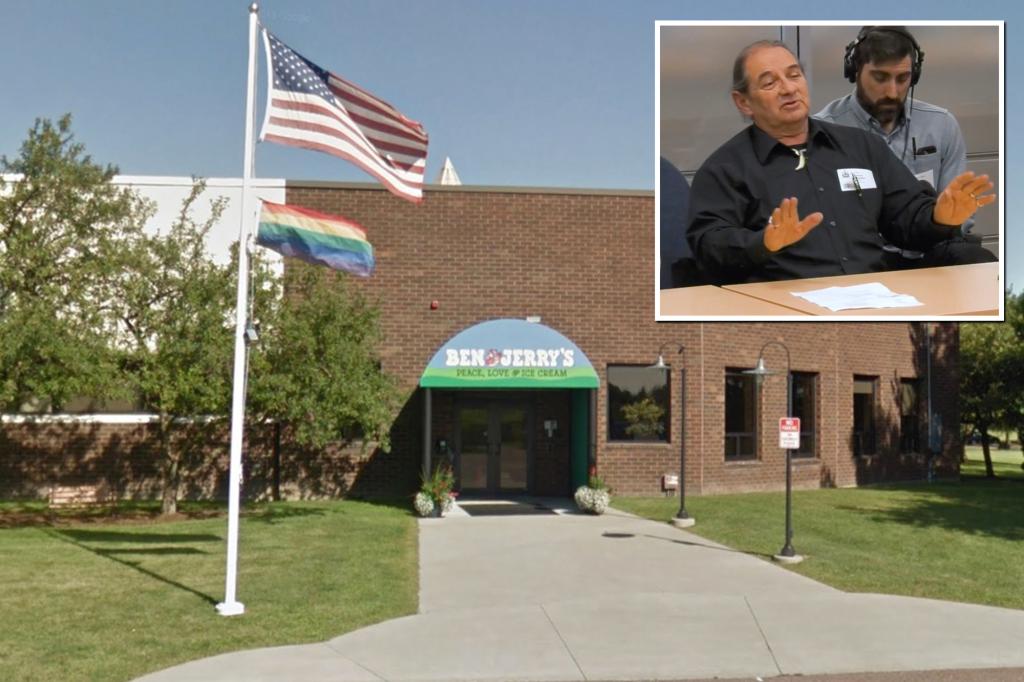Indigenous tribes on both sides of the US-Canada border are squabbling over who is entitled to compensation from Ben & Jerry’s over its Vermont headquarters — which some claim sits on stolen land.
Chief Rick O’Bomsawin of the Quebec-based Abenaki Bank Council of Odanak told The Post that if Ben & Jerry’s plans to return land to Indigenous tribes, it should be his group that receives it.
“This is my territory,” the Canada-based chief told The Post on Friday. “The territory that they’re speaking of is actually my people’s territory. That territory is our homeland.”
O’Bomsawin’s comments came in response to recent claims put forth by Vermont-based Nulhegan Ban of the Coosuk Abenaki Nation, whose chief has said it would be interested in seeing the return of the land.
Don Stevens, chief of the Nulhegan Band of the Coosuk Abenaki Nation, one of four tribes descended from the Abenaki that are recognized in Vermont, told The Post last week that Ben & Jerry’s should reach out to him if it was “sincere” in starting a dialogue about the return of the land.
But O’Bomsawin says that the Vermont-based tribe, which received state recognition of its claims of Indigenous lineage, did so on the basis of “hearsay.”


“They can prove no link to the Abenaki nation,” the chief told The Post. “The Abenaki people left the state of Vermont and New Hampshire [some three centuries ago] and moved to Canada.”
The question of who the rightful owner of the land atop which sits Ben & Jerry’s headquarters gained momentum after the ice cream giant posted a July 4 tweet insisting that the US was “stolen Indigenous land.”
The tweet, which sparked widespread outrage, also prompted the Canadian tribe to publicly declare that it was the rightful owner of the land where Ben & Jerry’s has placed its headquarters.

“The Wôbanaki [another spelling of Abenaki] Nation agrees that there should be compensation for the land,” the Canadian tribe said in a statement following a council meeting on Monday.
“However, it’s important to remember that Odanak and Wôlinak are the only two officially recognized Abenaki communities,” the Canadian tribe added. “It is therefore essential that compensation is not distributed among self-proclaimed Abenaki groups.”
Earlier this year in March, O’Bomsawin invited Vermont-based tribes claiming the same lineage to meet for talks, continuing to assert that they hadn’t shared the genealogical and historical evidence showing they are Abenaki.

This week’s statement from the Canada-based tribe was first reported on by Newsweek.
In response, a spokesperson for the Vermont-based group shot back that it was “unfortunate that a legal entity outside of the United States would insert itself into another country’s conversation for political and financial gain.”
The rep for the Vermont-based Abenaki Alliance told The Post that the group had “never been our motivation” to seek compensation, but that it nevertheless met state criteria for recognition after providing documents proving genealogical heritage.
The alliance is “in a position of responsibility for Native issues that involve homelands within Vermont” and Ben & Jerry’s July 4 message “involved a Vermont-based corporation on Abenaki homelands now known as Vermont,” the spokesperson added.

Stevens told The Post in an interview last week that he “looks forward to any kind of correspondence with the brand to see how they can better benefit Indigenous people.”
Stevens said Ben & Jerry’s should reach out to him as the company’s corporate headquarters — located at 30 Community Dr. in South Burlington, Vt. — is situated on Western Abanaki land.
“If you look at the [Abenaki] traditional way of being, we are place-based people. Before recognized tribes in the state, we were the ones who were in this place,” Stevens said, adding that the Abenaki view themselves as “stewards of the land.”

The Post has sought comment from Ben & Jerry’s.
Additional Reporting by Shannon Thaler
𝗖𝗿𝗲𝗱𝗶𝘁𝘀, 𝗖𝗼𝗽𝘆𝗿𝗶𝗴𝗵𝘁 & 𝗖𝗼𝘂𝗿𝘁𝗲𝘀𝘆: nypost.com
𝗙𝗼𝗿 𝗮𝗻𝘆 𝗰𝗼𝗺𝗽𝗹𝗮𝗶𝗻𝘁𝘀 𝗿𝗲𝗴𝗮𝗿𝗱𝗶𝗻𝗴 𝗗𝗠𝗖𝗔,
𝗣𝗹𝗲𝗮𝘀𝗲 𝘀𝗲𝗻𝗱 𝘂𝘀 𝗮𝗻 𝗲𝗺𝗮𝗶𝗹 𝗮𝘁 dmca@enspirers.com


